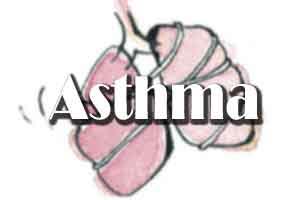- Home
- Editorial
- News
- Practice Guidelines
- Anesthesiology Guidelines
- Cancer Guidelines
- Cardiac Sciences Guidelines
- Critical Care Guidelines
- Dentistry Guidelines
- Dermatology Guidelines
- Diabetes and Endo Guidelines
- Diagnostics Guidelines
- ENT Guidelines
- Featured Practice Guidelines
- Gastroenterology Guidelines
- Geriatrics Guidelines
- Medicine Guidelines
- Nephrology Guidelines
- Neurosciences Guidelines
- Obs and Gynae Guidelines
- Ophthalmology Guidelines
- Orthopaedics Guidelines
- Paediatrics Guidelines
- Psychiatry Guidelines
- Pulmonology Guidelines
- Radiology Guidelines
- Surgery Guidelines
- Urology Guidelines
People with asthma at increased risk for atrial fibrillation : JAMA

Asthma and lack of asthma control are associated with increased risk of atrial fibrillation (AF), according to a new study published in the journal JAMA Cardiology.
Aivaras Cepelis, Norwegian University of Science and Technology, Trondheim, Norway, and colleagues conducted the study to assess the association between asthma, levels of its control, and AF.
Asthma, a chronic inflammatory airway disease, and atrial fibrillation (AF) share several common pathophysiological mechanisms. Research on the association between asthma and atrial fibrillation is lacking and no previous studies have assessed the dose-response association between levels of asthma control and AF.
For the study, the researchers analyzed data on adults from a second and third iteration of the survey-based Nord-Trøndelag Health Study (HUNT) in Norway. All included participants were free from AF at baseline. AF was ascertained by linking HUNT data with hospital records from the 2 hospitals in Nord-Trøndelag County. Data analysis was completed from May 2017 to November 2017.
Read Also: Healthy diet reduces asthma symptoms
A total of 54 567 adults were included (of whom 28 821 [52.8%] were women). Of these, 5961 participants (10.9%) reported ever having the airway disease, 3934 participants (7.2%) reported being diagnosed with the disease, and 2485 participants (4.6%) reported having active asthma.
Key Findings:
- 3.8 percent of participants developed AF during a mean follow-up of 15.4 years.
- Compared to participants without asthma, those with physician-diagnosed asthma had a significantly increased risk of developing AF (adjusted hazard ratio, 1.38).
- A dose-response association was seen between levels of asthma control and AF risk, with the highest risk for those with uncontrolled asthma (adjusted hazard ratio, 1.74).
- Diagnosed asthma was associated with a 38% increased risk of AF, and there was a dose-response association between levels of asthma control and AF.
"Asthma and lack of its control were associated with moderately increased risks of AF in a dose-response manner. Further studies are needed to explore the underlying mechanisms and clarify causal pathways between AF and asthma," concluded the authors.
For further information log on to 10.1001/jamacardio.2018.1901

Disclaimer: This site is primarily intended for healthcare professionals. Any content/information on this website does not replace the advice of medical and/or health professionals and should not be construed as medical/diagnostic advice/endorsement or prescription. Use of this site is subject to our terms of use, privacy policy, advertisement policy. © 2020 Minerva Medical Treatment Pvt Ltd